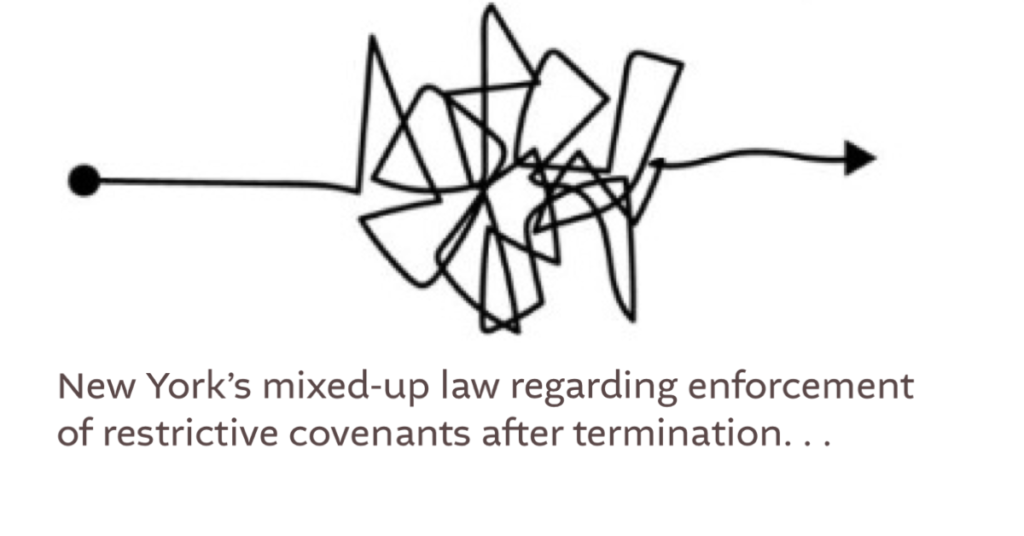New York’s Mixed-Up Law on Enforcement of Restrictive Covenants After Termination

By Thomas E. Chase, Esq.
May 8, 2024
I love writing about legal landmines in my area of practice relating to employment and competition law. And boy, there are a lot of landmines!
One question that trips up many attorneys is whether an employer may enforce a restrictive covenant after terminating an employee. Many New York attorneys assume that employers may not enforce restrictive covenants if they terminate an employee. Woops, the law is not so clear. Here is a quick summary.
New FTC Rule Drops a Grenade On NY Competition Law
First, the Federal Trade Commission’s recent rule barring non-competes throws much of New York restrictive covenant law into uncertainty. Many believe the FTC overstepped its rule-making authority and the rule will be found to be unenforceable. But even if the rule is found to be enforceable, it is not clear whether it applies only to “non-compete” agreements or to other non-solicit, non-recruit, and non-disclosure agreements restraining employees. I will write about this in later posts. Assuming that some New York restrictive covenants survive the FTC rule, the question remains, Can an employer enforce them after terminating an employee??
Cases Flunking Restrictive Covenants When Employee Terminated
Several New York courts have boldly held that employers cannot enforce restrictive covenants after they terminate employees. Practitioners with the bad luck of coming across these cases may search no further, confident that the issue has been decided in favor of employees. In King v. Marsh & McLennan Agency, LLC, 191 A.D.3d 507 (1st Dep’t 2021), the First Department reviewed an appeal in which the central issue was whether the employee was terminated for cause or without cause. Either way, the Court concluded, the employee’s restrictive covenant was unenforceable because the employer terminated the employee. Id. at 508 (“In light of the above, we need not reach the issue as to the enforceability of the non-solicitation agreement.”). The Court cited what appeared to be a murderers’ row of dispositive case law on the matter:
See Kolchins v Evolution Mkts., Inc., 182 AD3d 408, 409 [1st Dept 2020] [“these (restrictive) covenants are not enforceable because Evolution did not have a ‘continued willingness’ to employ Kolchins, despite Kolchins’s continued desire to work for the company”]; Buchanan Capital Mkts., LLC v DeLucca, 144 AD3d 508, 508 [1st Dept 2016] [restrictive covenants “are not enforceable if the employer does not demonstrate continued willingness to employ the party covenanting not to compete”; Grassi & Co., CPAs, P.C. v Janover Rubinroit, LLC, 82 AD3d 700, 702 [2d Dept 2011] [because the employer terminated the employee without cause, both the forfeiture and the restrictive covenant were unenforceable]; Borne Chem. Co. v Dictrow, 85 AD2d 646, 649 [2d Dept 1981] [restrictive covenant was unenforceable where employee was terminated “without just cause”]). Concur—Acosta, P.J., Kapnick, Singh, Mendez, JJ. [Prior Case History: 67 Misc 3d 1203(A), 2020 NY Slip Op 50370.]
Many attorneys would stop researching after encountering such a daunting string cite. But they would be underestimating the frustrating complexity of New York law.
Cases Enforcing Restrictive Covenants When Employees Are Terminated
Other recent New York courts have enforced restrictive covenants even though the employer terminated the employee. See Kelley-Hilton v. Sterling Infosystems Inc., 426 F.Supp.3d 49, 59 (S.D.N.Y. 2019) (holding that restrictive covenant was enforceable “whether [the employee’s] employment was terminated with or without cause”); Davis v. Marshall & Sterling, Inc., 217 A.D.3d 1073, (3rd Dep’t 2023) (rejecting employees’ defense that they were terminated without cause, stating “the circumstances of their terminations are irrelevant to the question of enforceability of the employment agreements”). It is impossible to reconcile these cases with the cases cited above.
Conclusion
Attorneys and businesses should be aware of the unsettled law in this area. Particularly frustrating is the conclusiveness with which New York courts write on the topic. Practitioners encountering either line of cases might justifiably believe the issue is settled under New York law, but that would be a mistake.